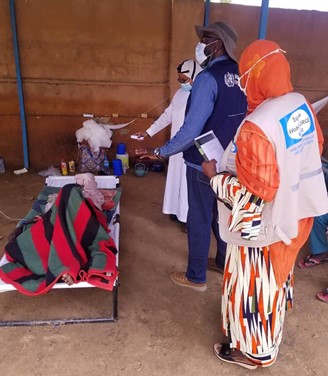
- Report -

Ukraine
Making every school a health-promoting school: global standards and indicators
author




- Improved access to quality essential health services irrespective of gender, age or disability status
- Countries enabled to provide high-quality, people-centred health services, based on primary health care strategies and comprehensive essential service packages
- Health emergencies rapidly detected and responded to
First deployment of the SURGE team in Niger in response to the cholera epidemic
Niger faces recurrent epidemics including meningitis, cholera, measles and other emerging diseases. Response to epidemics must be fast to curtail their spread. To improve response time, WHO’s Strengthening and Utilizing Response Groups for Emergencies (SURGE) flagship initiative was implemented in Niger in 2022. In August 2022, the country experienced a cholera outbreak in Zinder and Maradi regions. A multidisciplinary SURGE team of 18 national experts was deployed within 48 hours to coordinate the response, helping to quickly curb infections. A drop in cases was observed in the Maradi region within 72 hours. This prompt response resulted in low case and mortality numbers relative to the population at risk. In 2022, only four health districts were affected by cholera and a total of 68 cases and two deaths were reported. This is much lower than the 2021 cholera epidemic prior to SURGE when 35 health districts were affected leading to 5596 cases and 166 deaths.
Key WHO Contributions
Establishing the SURGE teams
Training SURGE and laboratory teams and providing them with equipment
Developing a response plan
Establishing a cholera treatment unit
Evaluating health facilities and implementing WASH interventions
Guiding risk communication and community engagement activities..
How did Niger, with the support of the WHO Secretariat, achieve this?
WHO Niger created SURGE teams in the capital city Niamey, then developed their capacity by providing eight training sessions in laboratory surveillance and infection prevention and control (IPC). Eleven doctors, 14 epidemiologists, seven laboratory technicians, eight communicators, two anthropologists and nine IPC specialists were trained to ready them for deployment in emergencies across the country. In addition to funding and technical expertise for the trainings, WHO Niger provided supplies and equipment which, to increase preparedness, were prepositioned in advance. This included three cholera drug kits, protective equipment and six treatment tents.
“With logistics prepared and equipment prepositioned in advance, the trained SURGE team and medical and paramedical supplies were deployed in less than 48 hours, making it possible to quickly confine the epidemic”
- Dr Kourouma, SURGE Niger Coordinator
SURGE teams were deployed to coordinate the response in two districts with the support of 10 technical experts from WHO Niger. The Ministry of Health coordinated the response with WHO through the Public Health Emergency Operations Centre (COUSP). WHO Niger experts provided technical expertise to develop a response plan, hold daily coordination meetings, oversee implementation, develop and disseminate the daily situation report and train local field teams in cholera diagnosis, infection control and integrated integrated disease surveillance and response. Field teams then searched for and investigated cases, and collected and delivered specimens.

The WHO SURGE team treats a patient during a 2022 cholera outbreak in Niger.
Photo credit: WHO Niger.
When the first cases of cholera were registered in 2022, confirmation of the samples was carried out in the field by the mobile laboratory. Mobile laboratory teams also mentored local teams to build their capacity, including Maradi Regional Hospital’s laboratory team that now confirms cholera outbreaks in the region and neighbouring areas. To improve the quality of cholera case management, WHO developed the capacity of local teams and financed the opening of cholera treatment units to provide free care.
“It took us three months to deploy the mobile laboratory team during the large cholera outbreak in 2021. This time, thanks to the SURGE project, the mobile laboratory team was deployed in just 48 hours. It's a first! We could rapidly confirm suspected cases on site in Maradi while simultaneously strengthening the regional hospital’s laboratory’s capacity. Now the laboratory can culture Vibrio cholerae we have a new regional centre for biological confirmation”
- Dr Sani, Member of SURGE team, CERMES centre for medical and health research)
Water, Sanitation and Hygiene (WASH) Experts from WHO Niger and WHO Regional Office for Africa worked directly with communities in the field to evaluate health facilities in the region and then reduce disease transmission through WASH interventions including implementation of the ring strategy to limit transmission between close contacts, distribution of soaps and water purification tablets and installation of handwashing facilities at key assembly points.
WHO Niger adapted WHO’s global guidance on risk communications and community engagement and provided key messages for use in the local context. SURGE teams then engaged the community to improve risk awareness and participation in disease prevention activities. They visited religious leaders to encourage them to raise awareness during sermons in mosques and community health focal points to mobilize them to conduct sensitization sessions in and around homes.
Strong coordination was crucial to operationalize the response. A WhatsApp group was used to share information between districts, while communications with districts in neighbouring Nigeria facilitated contract tracing and health information exchange across borders.
WHO’s work was only possible due to close One Health collaboration with the Federal Ministries of Health, Agriculture and Rural Development, and Environment as well as their agencies, which co-led support and response efforts. Through the efforts of WHO Niger and the SURGE team and their endeavours to boost local capacity, Niger is now in a much stronger position to rapidly detect and respond to health emergencies when they emerge in the future. WHO continues to work in Niger to build and sustain preparedness capacity.
- Improved access to quality essential health services irrespective of gender, age or disability status
- Countries enabled to provide high-quality, people-centred health services, based on primary health care strategies and comprehensive essential service packages
